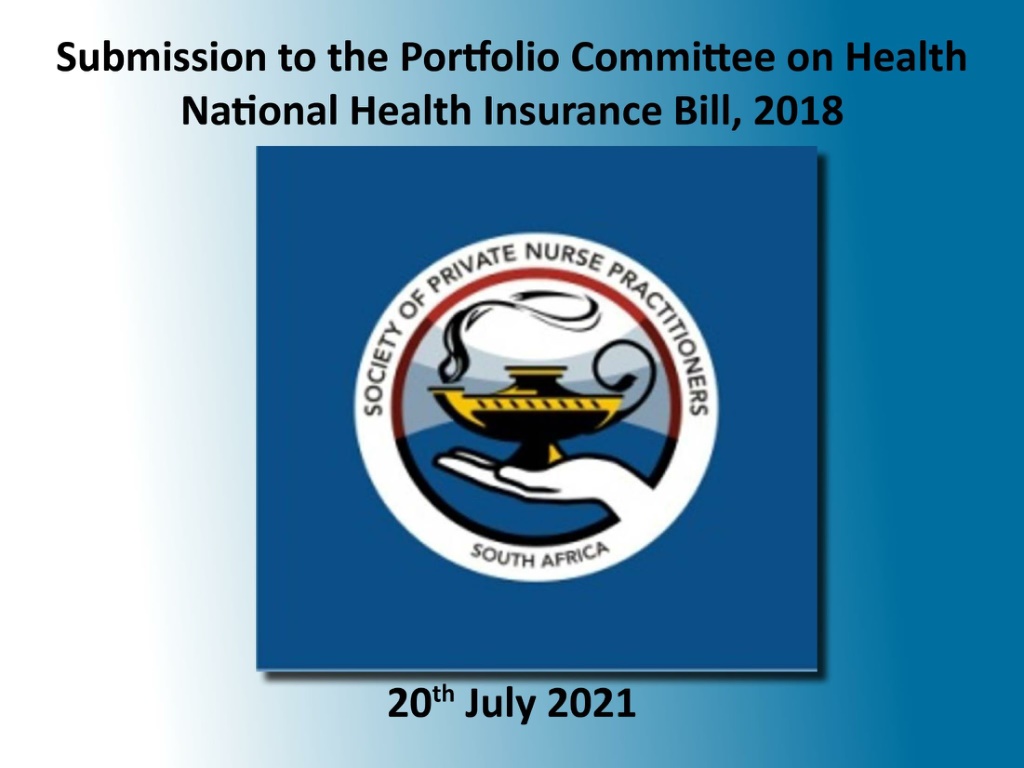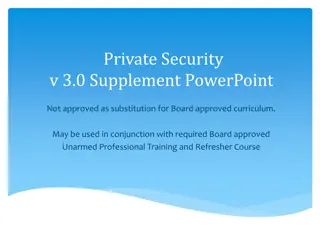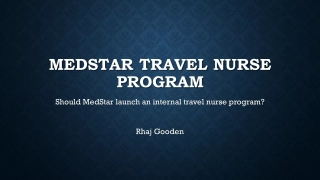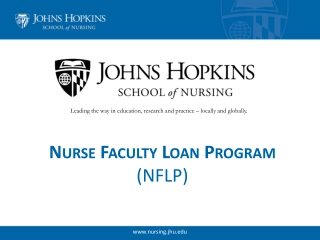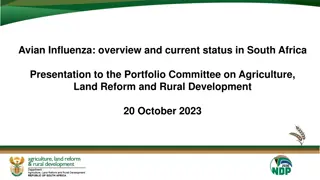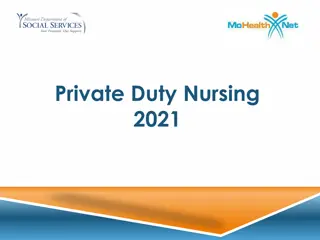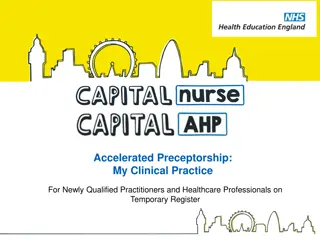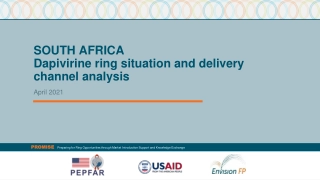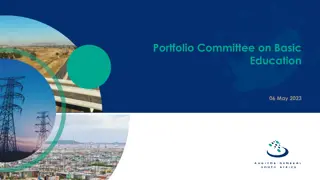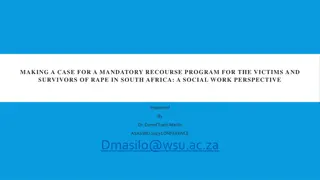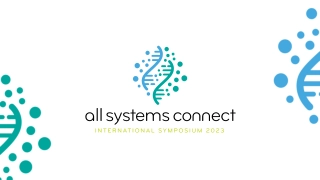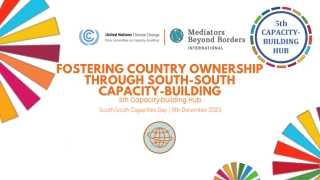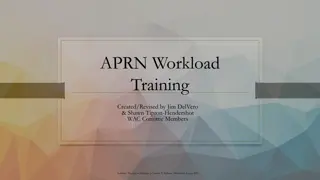Private Nurse Practitioners in South Africa: Overview and Services
Society of Private Nurse Practitioners of South Africa represents independently and interdependently practicing nurse practitioners. They advocate for affordable healthcare, with a focus on patient-centered care. Private Nurse Practitioners provide fee-for-service nursing care and offer various services such as wound care, psychiatry, midwifery, palliative care, and more.
Download Presentation
Please find below an Image/Link to download the presentation.
The content on the website is provided AS IS for your information and personal use only. It may not be sold, licensed, or shared on other websites without obtaining consent from the author. Download presentation by click this link. If you encounter any issues during the download, it is possible that the publisher has removed the file from their server.
Presentation Transcript
Representatives Society of Private Nurse Practitioners of South Africa Dr Nkhensani Mukoki (National President of SPNP) Mrs Gertrude Nare (Immediate Past President) Mrs Debbie Regensberg (Honorary Secretary / Treasurer) 2
The Society of Private Nurse Practitioners of South Africa We represent nurse practitioners who practice independently and interdependently throughout South Africa Support the call to provide affordable and accessible health care in line with Article 12 of the United Nations Covenant, the African Charter on Human and People s Rights, and our Constitution, as noted in the preamble to this Bill. We choose to work as self employed nurses as it give us the privilege of providing a level of quality care which puts our patients and their needs at the centre of our practice Society of Private Nurse Practitioners of South Africa 3
Who is a Private Nurse Practitioner (PNP)? Society of Private Nurse Practitioners of South Africa Professional Nurses and Midwives Registered by the South African Nursing Council Provide nursing care on a fee for service basis, Reimbursed directly or indirectly by the patient or NGOs. * Does not include practitioners who are salaried, eg. Agencies (duty nurses), doctors consulting rooms, pharmacy nurses or occupational health clinics nurses on salaries. * But these practitioners also contribute toward reduction of cost of care & face most challenges being presented 4
Practice Models Society of Private Nurse Practitioners of South Africa Independent practitioners sole proprietor, partnership, private companies Health centres, Midwifery units & Pharmacy- based clinics Franchise-type model Unjani & Owethu / Sha p Left primary health clinics Reimbursement Fee-for-service Direct or 3rd party funding Registered as NPOs / PBOs 5
SERVICES PROVIDED BY PNPs Consultation, not shift based including General frail care, home visits Wound care Basic & Advanced Psychiatry Lymphoedema manag t Stomatherapy Dermatology Palliative care / end of life Education Society of Private Nurse Practitioners of South Africa Childbirth education Midwifery ANC, PNC, Births Lactation consultants Immunization and Well Baby clinics School nursing Occupational health / wellness Renal dialysis 6
PRACTICE SETTINGS Society of Private Nurse Practitioners of South Africa Rural Informal settlements Industrial areas Urban Business & Residential areas City Centres Gauteng: Mpumulanga: North West : Limpopo: KZN: Western Cape 118 Eastern Cape 22 Other (including Free State, N.Cape, other etc) 12 Group practices 22 Corporate members: 14 150 19 21 32 81 Patients homes Hospitals Workplaces Consulting rooms Pharmacies 7
Nursing challenges Society of Private Nurse Practitioners of South Africa Nursing legislation continues to restrict recognition of expertise and skills of critically skilled practitioners eg Primary health care prescribing of EDL, issuing sick certificate Recognition of nurses as independent practitioners and employers, not only employees Inclusion in NHS / NHI / PMB policy setting processes limited to SANC or DOH, limiting perspectives and recognition of different challenges & practice contexts 14
Regulatory challenges Society of Private Nurse Practitioners of South Africa Challenges of conflicting legislation, often due to outdated information Focus is on facilities not services Acts: Nursing Act, particularly S56 (6) Medicines & Related Substances Act Regulations: Certificate of Need (in comment phase) Office of Health Standards Compliance Various Nursing regulations in process 15
Technological challenges Society of Private Nurse Practitioners of South Africa Advances in health services and health care provided by nurses not recognised / reimbursed by funders, not available in public sector Clinic facilities not aligned to draft regulations but approved for services Ideal Clinic standards: outreach units, eg. Mobile clinics, Portable prefabricated containers Telehealth providing referral pathways 16
Representation Society of Private Nurse Practitioners of South Africa 5. The Fund must (c ) design health care services as advised by the relevant committee Composition of Ministerial Committees Registered Nurses, who provide the backbone of healthcare had one representative across all committees through the SANC We do not believe that this one person on their own could represent the healthcare needs of all the different patients We therefore question the value of the nomination and selection processes 18
Prices / Fee structures Society of Private Nurse Practitioners of South Africa (f) determine prices annually after consultation with health care providers, health establishments and suppliers in the prescribed manner and in accordance with the provisions of this Act; (k) ensure that health care providers, health establishments and suppliers are paid in accordance with the quality and value of the service provided to users at every level of care; Our experience has shown that fees have been set against public sector salaries, not taking into account overhead costs of business. (NHRPL, BHF prior to 2008) Omission of nursing representatives on the relevant Ministerial Committees. Differentiation between levels of care Generalists vs Specialists, if based on SANC criteria, will exclude services such as Advanced wound care, Stomatherapy, Lactation Consulting, and similar which are not linked to academic requirements for registration as specialists 19
Payment of providers Society of Private Nurse Practitioners of South Africa S39 refers to the payment of primary service providers at health establishments must be funded on a risk adjusted capitation basis .. 1. The provision of homebased (domiciliary) nursing service in the public sector is critical to reduction in in-patient admissions, facilitation of early discharges and provision of appropriate levels of community based care. Our public health services do not provide these nursing services, particularly for more advanced nursing needs. The range of PMBs published to date have very limited reference to nursing care 20
Payment of providers (2) Society of Private Nurse Practitioners of South Africa 2. Many rural areas do not have access to or are not serviced by medical practitioners, and public clinic services are provided once or twice weekly. The Society seeks clarity on the proposed capitation structures and who would qualify as the primary service provider , and the allocation of services against this capitation fee in areas where nurses currently practice. This appears to be in contrast to the content of S52 (2) (b) which requires the Minister to make regulations for mechanisms to enable the payment of individual health care workers and health professionals 21
Registration, licensing or accreditation Society of Private Nurse Practitioners of South Africa (l) monitor the registration, license or accreditation status, as the case may be, of health care providers, health establishments and suppliers; Current Nursing Act (2005) and supporting regulations do not recognize or enable appropriately skilled nurses outside public sector to diagnose and prescribe in terms of S56(6) of the Act . S11 (5) & S33(1) of this proposed legislation states that treatment protocols and guidelines will be developed and must be followed. Will this requirement be accepted by the SANC, the SAPC and NDOH to recognize the role of private practitioners, and an environment in which licenses to practice in terms of S56(6) may be granted? Particular areas of concern are Reproductive health, Primary Health Care including maternal and child health, NIMART and Palliative Care 24
Right to health care Society of Private Nurse Practitioners of South Africa S7 (3) acknowledges the right of access to NH services for various categories of users who are registered with the provider, subject to having an official identity document, birth certificate, or valid documentation from Dept of Home Affairs, or be a dependent. The Society is deeply concerned that there is no recognition of children or other persons without valid birth certificates. While we do not have the figures for this group, experience has shown that these children will be at risk if excluded. 25
Composition of the Board & Committees Society of Private Nurse Practitioners of South Africa The Society has reservations and expresses concern at the composition of various structures: S14(5) There appears to be no requirement that the Board should have an appropriately qualified / registered Health Care professional at the highest level of the Fund. S25(2) The Benefit Advisory Committee includes two representatives of the private hospital sector, but no representative of private community based professional organisations. This has the potential to continue to embed the focus of private health care in curative milieu, without due consideration for preventive, rehabilitative and community based curative and palliative needs. 26
Composition of Committees Society of Private Nurse Practitioners of South Africa The WHO defines health as a state of complete physical, mental and social well-being and not merely the absence of disease or infirmity. The Society believes that it is an extreme oversight to have omitted representation of the South African Council for Social Service Professions (SACSSP) as one of the professional councils from the Stakeholder Advisory Committee (S27). The broad range of services which Social Workers provide within the healthcare team, particularly for the most vulnerable members of society must be recognised through their inclusion in this Act. 27
Accredited service providers Society of Private Nurse Practitioners of South Africa S38(2) The omission of Social Workers from the potential list of accredited services providers is a further concern, given their role in the provision of health care and prevention of disease and infirmity. 28
Amendment to National Health Act (2003) The amended definition of health agency is commended. The provision of community based health care for the disabled, elderly and infirm is dependent on the caregivers who are currently not formally recognised is a concern due to the wide range of training and skills, often resulting in abuse of both the clients and the carers. The lack of recognition results in minimal reimbursement for these services, with dire consequences to the wellbeing of the patients in most instance. The Society will welcome an opportunity to develop the cadre of workers so that they can be included in the National Health services and funding. Society of Private Nurse Practitioners of South Africa 29
Transitional arrangments Society of Private Nurse Practitioners of South Africa The Society wishes to see an expansion of the inclusion of Private Nurse Practitioners in Phase 2 (S54) to complement the services provided as is currently practiced in selected provinces and local authorities to ensure that affordable and effective health care can reach every member of the community. 30
